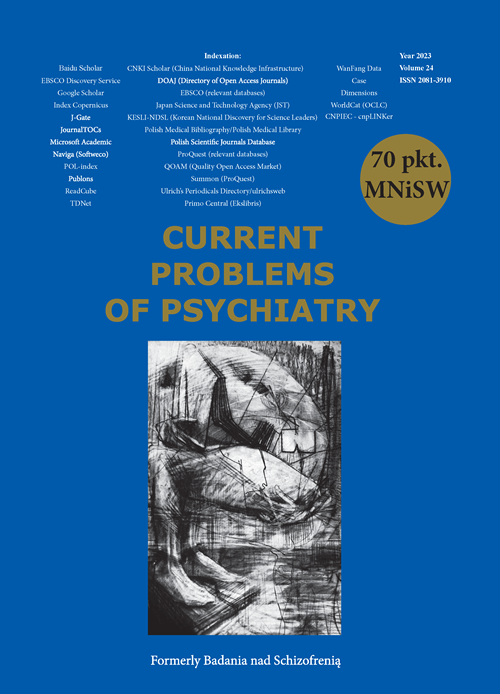Life satisfaction of nursing, midwifery and emergency medicine students during the COVID-19 pandemic
DOI:
https://doi.org/10.12923/2353-8627/2023-0006Keywords:
students, life, COVID-19, personal satisfactionAbstract
Introduction: The COVID-19 pandemic has affected life satisfaction of students of medical and health science. The aim of this study was to assess the level of life satisfaction among undergraduate students of nursing, midwifery and emergency medicine during the COVID-19 and to evaluate the impact of adherence to COVID-19 disease prevention measures on their level of life satisfaction.
Material and methods: The study was conducted using a self-constructed questionnaire and a standardized psychological questionnaire, the Satisfaction with Life Scale, among students of nursing, midwifery and emergency medicine in the Pomeranian Voivodeship during the COVID-19 pandemic.
Results: A total of 37 men and 238 women participated in the study. The mean age of all students was 21.5 (SD±3.83, min-max 19-39). The number of 93% of respondents reported avoiding people who coughed and had a cold, and 85.5% avoided large gatherings. When it comes to 84% of the students, they were vaccinated. As far as 73% of the students are concerned, they estimated that they had a medium level of knowledge about SARS-CoV-2 infection. Most students had a low (39.3%) and medium (32.7%) level of life satisfaction. A total number of 28% of the students reported a high satisfaction with life. There was not evidence of the influence of gender, field of study, year of study and the preventive behaviours on their level of life satisfaction.
Conclusions: Most Polish students of nursing, midwifery and emergency medicine had a low and medium level of life satisfaction during the COVID-19 pandemic. Of the possible preventive behaviours, Polish students most often avoided people who coughed and had a cold, and they avoided large gatherings. Not all students registered for vaccination.
References
1. Gorbalenya AE, Baker SC, Baric RS, et al. The species Severe acute respiratory syndrome-related coronavirus. Classifying 2019-nCoV and naming it SARS-CoV-2. Nat Microbiol. 2020;5:1-9. https://doi.org/10.1038/s41564-020-0695-z
2. Law S, Leung AW, Xu C. Severe acute respiratory syndrome (SARS) and coronavirus disease-2019 (COVID-19): from causes to preventions in Hong Kong. Int. J. Infect. Dis. 2020;94: 156-163. https://doi.org/10.1016/j.ijid.2020.03.059
3. World Health Organization. WHO Coronavirus (COVID-19) Dashboard [Internet] https://covid19.who.int/ access 05.01.2022
4. Rogowska AM, Kuśnierz C, Bokszczanin A. Examining anxiety, life satisfaction, general health, stress and coping styles during COVID-19 pandemic in Polish sample of university students. Psychol Res Behav Manag. 2020;13: 797-811. https://doi.org/10.2147/prbm.s266511
5. Casafont C, Fabrellas N, Rivera P, et al. Experiences of nursing students as healthcare aid during the COVID-19 pandemic in Spain: A phemonenological research study. Nurse Educ Today. 2021;97: 104711. https://doi.org/10.1016/j.nedt.2020.104711
6. Labrague JL. Psychological resilience, coping behaviours and social support among health care workers during the COVID‐19 pandemic: A systematic review of quantitative studies. J Nurs Manag. 2021;29: 1893-1905. https://doi.org/10.1111/jonm.13336
7. Stefanowicz-Bielska A, Słomion M, Stefanowicz J. COVID-19 Pandemic—Knowledge, Attitudes, Behaviours, and Actions among Faculty of Health Sciences Students. Int J Environ Res Public Health. 2021; 18(22): 12137. https://doi.org/10.3390/ijerph182212137
8. Diener E, Emmons RA, Larsen RJ, Griffin S. The satisfaction with life scale. J Pers Assess. 1985;49: 71-75.
9. Juczyński Z. Skala Satysfakcji z Życia- SWLS. Adaptacja Skali Satysfakcji z Życia-SWLS. [In:] Szustrowska T, Ed. Narzędzia Pomiaru w Promocji i Psychologii Zdrowia, 2nd ed.; Warsaw, Poland: Pracownia Testów Psychologicznych Polskiego Towarzystwa Psychologicznego; 2012, pp.128-133. https://doi.org/10.15557/pipk.2019.0026
10. Stefanowicz-Bielska A, Słomion M, Rąpała M. Life Satisfaction of Nurses during the COVID-19 Pandemic in Poland. Int J Environ Res Public Health. 2022; 19(24): 16789. https://doi.org/10.3390/ijerph192416789
11. Albaqawi HM, Alquwez N, Balay-Odao E, et al. Nursing students' perceptions, knowledge, and preventive behaviors toward COVID-19: A multi-university study. J Pers Assess. 2020;8: 573390. https://doi.org/10.3389/fpubh.2020.573390
12. Mena-Tudela D, González-Chordá VM, Andreu-Pejó L, et al. Spanish nursing and medical students' knowledge, confidence and willingness about COVID-19: A cross-sectional study. Nurse Educ Today. 2021;103: 104957. https://doi.org/10.1016/j.nedt.2021.104957
13. Ayed A, Zabn K. Knowledge and attitude towards COVID-19 among nursing students: Palestinian perspective. SAGE Open Nurs. 2021;13(7): 23779608211015150. https://doi.org/10.1177/23779608211015150
14. Fakhri N, Jallal M, Belabbes S, et al. COVID-19 and Moroccan nursing students: A multicentre cross-sectional survey on their related knowledge, attitudes and practices. Nurs Open. 2021;8(4): 1634-1641. https://doi.org/10.1002/nop2.790
15. Baniyas N, Sheek-Hussein M, Al Kaabi N, et al. COVID-19 knowledge, attitudes, and practices of United Arab Emirates medical and health sciences students: A cross sectional study. PLoS One. 2021;16(5): e0246226. https://doi.org/10.1371/journal.pone.0246226
16. Aslan I, Ochnik D, Çınar O. Exploring perceived stress among students in Turkey during the COVID-19 pandemic. Int. J. Environ. Res. Public Health. 2020;17(23): 8961. https://doi.org/10.3390/ijerph17238961
17. Bodys-Cupak I, Majda A, Kurowska A, et al. Psycho-social components determining the strategies of coping with stress in undergraduate Polish nursing students. BMC Nurs. 2021;20(129): 1-13. https://doi.org/10.1186/s12912-021-00630-2
18. Kupcewicz E, Grochans E, Mikla M, et al. Role of global selfesteem in predicting life satisfaction of nursing students in Poland, Spain and Slovakia. Int J Environ Res Public Health. 2020;17(15): 5392. https://doi.org/10.3390/ijerph17155392
Downloads
Published
Issue
Section
License
Copyright (c) 2023 Authors

This work is licensed under a Creative Commons Attribution 4.0 International License.


